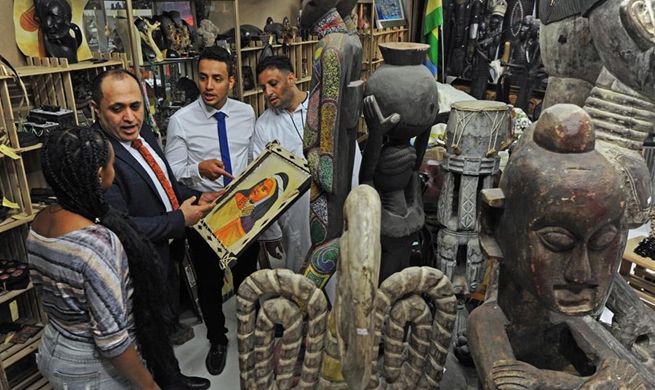by Burak Akinci
ANKARA, Jan. 21 (Xinhua) -- Turkey's world renowned revolutionary poet, playwright and novelist Nazim Hikmet died 56 years ago, but his work is still relevant in our days as he condemned totalitarianism in his entire life with his profound humanistic stance.
On Jan. 15, many events were held across Turkey to commemorate the 117th anniversary of the birth of the great poet with plays and forums. But most of his lifetime, he was kept away from the Turkish public for his political views.
Dubbed the "blue-eyed giant" because of his tall stature and deep blue eyes, Nazim Hikmet Ran (1902-1963), commonly known as Nazim Hikmet or simply called Nazim by his admirers, is considered among main pillars of modern Turkish literature.
His works have been translated into dozens of languages.
Nazim gained worldwide fame for his anti-imperialist, anti-war and humanitarian communistic stance and his plays are constantly played in Turkey which he fled for his political beliefs after serving many difficult years in prison.
His radicalism was not welcomed then in his country.
His mastery of language, his use of free verse and a wide range of poetic theme strongly influenced Turkish modern literature in the late 1930s.
"When I was 24 years old, Nazim's work was censored in Turkey. There was not a single book or poem to be found around," said Genco Erkal, a prominent and acclaimed Turkish actor and director to Xinhua.
"In 1962, a first novel, Kuvayi Milliye Destani (the epic of Turkish Independence War), was published. The moment I read it, I was caught in a whirlwind of emotions and enthusiasm which I recall even today," added the 80-year-old criticality acclaimed actor famous for interpreting Nazim's plays and poems in Turkey and abroad for many years.
Born in Thessaloniki, Greece, then part of the Ottoman Empire, Nazim graduated from Ottoman Naval School and briefly served as a naval officer until 1920.
He later joined the Nationalist government in Anatolia and served as a teacher. Then he headed to Moscow to experience the early years of the Russian Revolution.
His first poetry book was published in the Soviet Union in 1924, and he returned to Turkey the same year. Due to his communist views and publications, Nazim was sentenced to 15 years in prison for sedition as a result of which he fled to the Soviet Union. But he returned to Turkey in 1928.
He was, however, again sentenced to 28 years in prison in 1938 and served 12 years until he was released by an amnesty in 1950 as his health deteriorated and many Turkish intellectuals and renowned figures including Pablo Picasso and Jean-Paul Sartre campaigned against his imprisonment.
Due to anti-communist public sentiment and government policies of the post-World War II era, fearing that he might be persecuted or taken into the military for compulsory service, Nazim first escaped to Romania, then to the Soviet Union. He was stripped of his citizenship in 1951.
Nazim's works were banned for decades in Turkey until he regained posthumously Turkish citizenship in 2009 after decades of controversial debate on his faith.
For Erkal, Nazim has become "an idol, a hero." And therefore, for 43 years now, Erkal is still reciting his poems on stage, in concert halls and political rallies.
"My thoughts and my emotions have become one with him and with time. Gradually I have become his spokesperson, his living voice," said the actor.
Until his death in 1963, Nazim lived in the Soviet Union, never returning to the land he loved so much. Tormented by homesickness, he wrote "you are my imprisonment and my freedom, my flesh, burning like a summer night, you are my country."
"No writer or poet affects Turkish society so much as he did. He has been a legend with his unjustified prison term and his exile because of his political ideas. Today, 55 years after his death, he is still the most significant poet and strikes a chord upon young generations," said Erkal.
The veteran actor added that he believes that Nazim's work transmits his optimism and faith in humankind amid all darkness and against all odds.
Erkal has been performing poetry readings for decades around the globe, such as a performance titled Insanlarim (My People), a collection of Nazim's poems.
"As I am celebrating my 60th year in theatre, I still live on stage with his poems," said Erkal.












